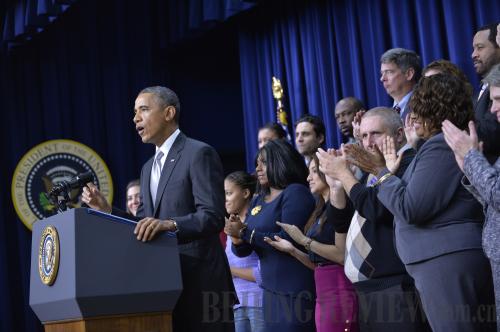|
 |
|
Barack Obama delivers a speech on his healthcare reform plan in the White House in Washington, D.C., on December 3, 2013 (XINHUA) |
Since its passage five years ago, the Affordable Care Act (AKA Obamacare) has been the target of relentless opposition and legal challenges. The bill mandating healthcare insurance for all Americans has survived each challenge, and the latest 6-3 decision by the Supreme Court on June 25 has saved Obamacare once again. Will its opponents finally accept defeat? Only time will tell.
The ruling holds that the Affordable Care Act intends to issue federal subsidies for all Americans, despite a challenge that the wording of the law provided tax credits only for those in states with their own health insurance exchanges. If the court had sided with a strict interpretation of the semantics, 6.4 million insured citizens in states that operate federal exchanges would have lost their coverage.
"Congress passed the Affordable Care Act to improve health insurance markets, not to destroy them," Chief Justice John Roberts wrote in the majority opinion. "If at all possible, we must interpret the act in a way that is consistent with the former, and avoids the latter."
Though Roberts is known as a conservative, the chief justice once again found himself the savior of Obamacare, much to the dismay of the Republican Party. Justice Antonin Scalia, leading the opposition, whined that the bill should be called SCOTUScare, since the Supreme Court has played such an integral part in preserving it.
The ruling has significant implications. By focusing on the intent of the bill, instead of the interpretation of the text, the court ensured the next generation of presidents could not undo the exchanges unilaterally. Instead, it will take an act of Congress and a president willing to sign it to kill Obamacare.
"Today, after more than 50 votes in Congress to repeal or weaken this law, after a presidential election based in part on preserving or repealing this law, after multiple challenges to this law in front of the Supreme Court, the Affordable Care Act is here to stay," President Obama said on June 25.
Despite losing the legal challenge, House Speaker John Boehner vowed to continue the fight against what conservatives see as an overstep of federal authority.
"The problem with Obamacare is still fundamentally the same: The law is broken," Boehner said. "It's raising costs for American families, it's raising costs for small businesses and it's just fundamentally broken. And we're going to continue our efforts to do everything we can to put the American people back in charge of their health care and not the federal government."
It may be, however, that the law is not too entwined with the healthcare industry to unravel. A ruling rejecting subsidies in states that rely on the Federal exchange system would have thrown the market into chaos, the ruling acknowledged.
"The statutory scheme compels us to reject petitioners' interpretation," Chief Justice Roberts wrote, referring to the challengers. "Because it would destabilize the individual insurance market in any state with a federal exchange, and likely create the very 'death spirals' that Congress designed the act to avoid."
"Death spirals" are created when many healthy customers go without healthcare coverage, leaving insurers with a sicker, more expensive pool of customers that raises prices for everyone--driving even more customers out of the system.
Obamacare isn't perfect. Hospitals are struggling under new reimbursement rules for treating the uninsured. Many of the poor, young and healthy choose to forego health insurance altogether, and flood emergency rooms for primary care. But for those Americans who are finally receiving health insurance after years of high costs and denied coverage, the Affordable Care Act is changing lives. Terry Donald, a self-employed junk hauler in St. Petersburg, Florida, told The Atlantic Monthly that he didn't fully appreciate the value of being insured until he sliced his leg open and needed surgery for a subsequent infection. The total billed to his insurer was more than $90,000, but Donald paid only a fraction in co-pays.
Donald and his wife pay about $200 per month for their health plan, because they get a tax credit through Obamacare that adds up to savings of about $5,000 per year. Before Obamacare, he remembers signing up for catastrophic plans that had deductibles over $10,000. "Just having that tax credit up front is a little ease of mind," he said. "You don't have to worry every month when the bill comes in."
Thanks to the Supreme Court, Donald will be able to keep his federal subsidy and maybe his grandchildren will too. This year, as the law turned 5, it was broadcast that hospitals saved $7.4 billion in uncompensated costs in 2014, thanks to the expansion of Medicare, 29 states had expanded emergency federal healthcare to those who make 133 percent of the federal poverty level, and the overall price tag for Obamacare dropped to $1.2 trillion, 11 percent less than originally projected by the Congressional Budget Office. With numbers like these, it seems America cannot afford to repeal the Affordable Care Act. Too many lives depend on it.
The author is a contributing writer to Beijing Review, living in New York City | 